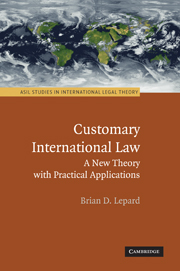Book contents
- Frontmatter
- Contents
- Figures
- Acknowledgments
- Cases
- PART ONE THE ENIGMAS OF CUSTOMARY INTERNATIONAL LAW
- PART TWO FOUNDATIONS OF A NEW THEORY OF CUSTOMARY INTERNATIONAL LAW
- PART THREE RESOLVING THE CONCEPTUAL ENIGMAS OF CUSTOMARY INTERNATIONAL LAW
- PART FOUR RESOLVING THE PRACTICAL ENIGMAS OF CUSTOMARY INTERNATIONAL LAW
- 12 General Sources of Evidence of Opinio Juris
- 13 The Role of Treaties as Evidence of Opinio Juris
- 14 The Role of United Nations General Assembly Resolutions as Evidence of Opinio Juris
- 15 The Role of Consistent State Practice
- 16 The Persistent Objector Exception
- 17 Defining Jus Cogens Customary Norms
- 18 Defining Erga Omnes Customary Norms
- 19 Resolving Conflicts with Treaties
- 20 Changing Customary International Law and the Role of International Organizations
- PART FIVE SOME APPLICATIONS OF THE THEORY
- PART SIX THE FUTURE OF CUSTOMARY INTERNATIONAL LAW
- Bibliography
- Index
14 - The Role of United Nations General Assembly Resolutions as Evidence of Opinio Juris
Published online by Cambridge University Press: 05 June 2012
- Frontmatter
- Contents
- Figures
- Acknowledgments
- Cases
- PART ONE THE ENIGMAS OF CUSTOMARY INTERNATIONAL LAW
- PART TWO FOUNDATIONS OF A NEW THEORY OF CUSTOMARY INTERNATIONAL LAW
- PART THREE RESOLVING THE CONCEPTUAL ENIGMAS OF CUSTOMARY INTERNATIONAL LAW
- PART FOUR RESOLVING THE PRACTICAL ENIGMAS OF CUSTOMARY INTERNATIONAL LAW
- 12 General Sources of Evidence of Opinio Juris
- 13 The Role of Treaties as Evidence of Opinio Juris
- 14 The Role of United Nations General Assembly Resolutions as Evidence of Opinio Juris
- 15 The Role of Consistent State Practice
- 16 The Persistent Objector Exception
- 17 Defining Jus Cogens Customary Norms
- 18 Defining Erga Omnes Customary Norms
- 19 Resolving Conflicts with Treaties
- 20 Changing Customary International Law and the Role of International Organizations
- PART FIVE SOME APPLICATIONS OF THE THEORY
- PART SIX THE FUTURE OF CUSTOMARY INTERNATIONAL LAW
- Bibliography
- Index
Summary
GENERAL PRINCIPLES
What role should United Nations (U.N.) General Assembly resolutions play in ascertaining opinio juris? The normative theory sketched here suggests a number of applicable principles. Other commentators have suggested similar lists of factors to be taken into account in determining the impact of General Assembly resolutions on the formation of customary international law in general, and opinio juris in particular, without of course considering the implications of the new definition of opinio juris that I have developed here.
First of all, General Assembly resolutions can be strong evidence of the views of U.N. member states relating to subjects within the competence of the General Assembly, which in fact are wide ranging and include economic as well as human rights issues. In this connection, Article 10 of the U.N. Charter provides that the “General Assembly may discuss any questions or any matters within the scope of the present Charter…and…may make recommendations to the Members of the United Nations or to the Security Council or both on any such questions or matters.” Furthermore, Article 13 affirms that the General Assembly “shall initiate studies and make recommendations” for a variety of purposes, including promoting international political cooperation, “encouraging the progressive development of international law and its codification,” promoting international cooperation “in the economic, social, cultural, educational, and health fields,” and “assisting in the realization of human rights and fundamental freedoms for all.”
- Type
- Chapter
- Information
- Customary International LawA New Theory with Practical Applications, pp. 208 - 217Publisher: Cambridge University PressPrint publication year: 2010



